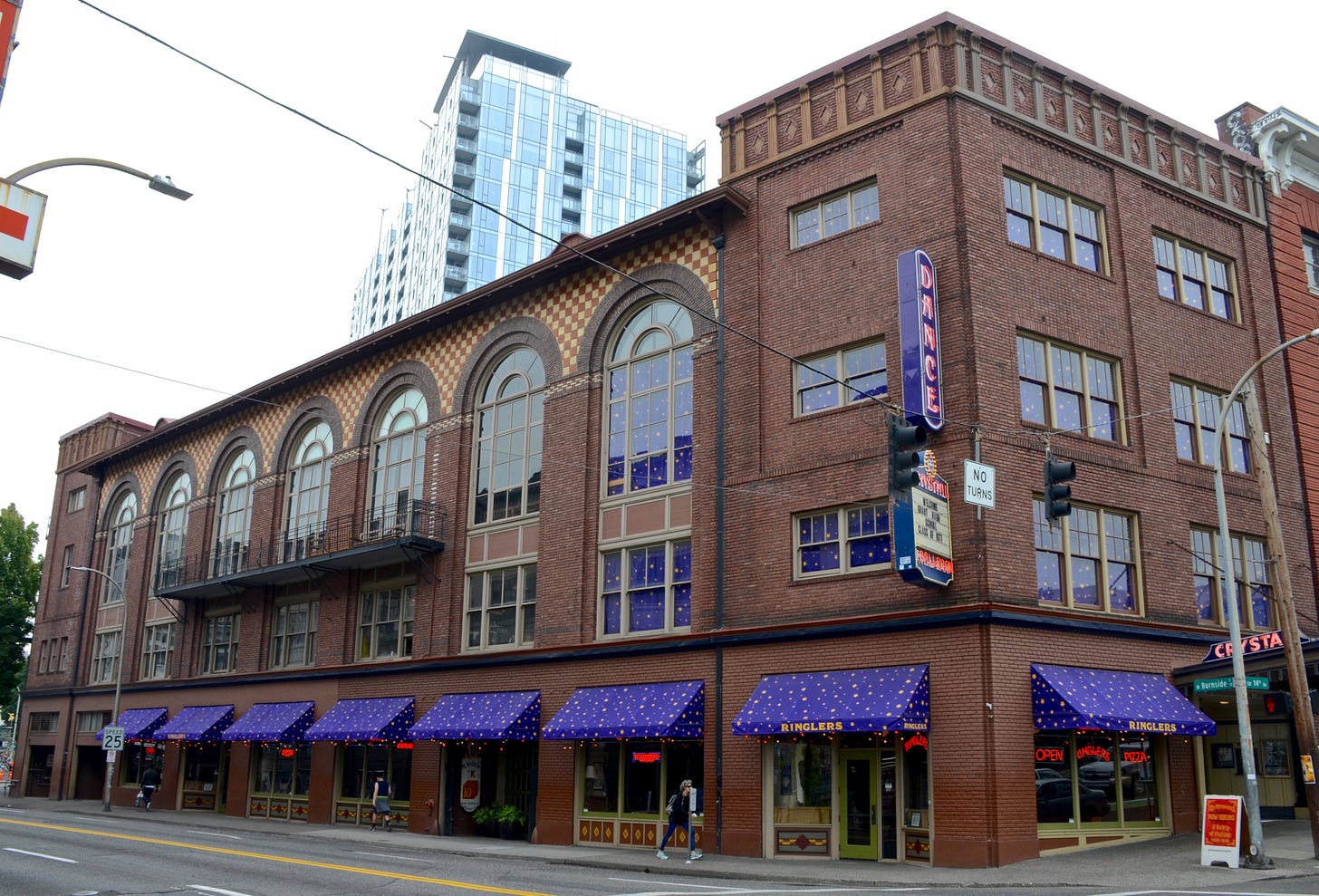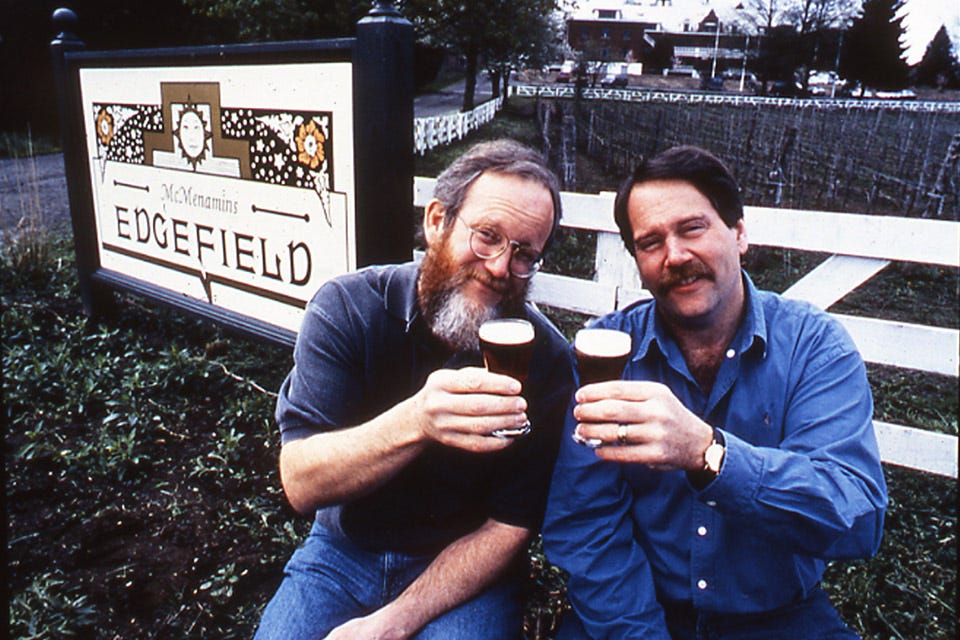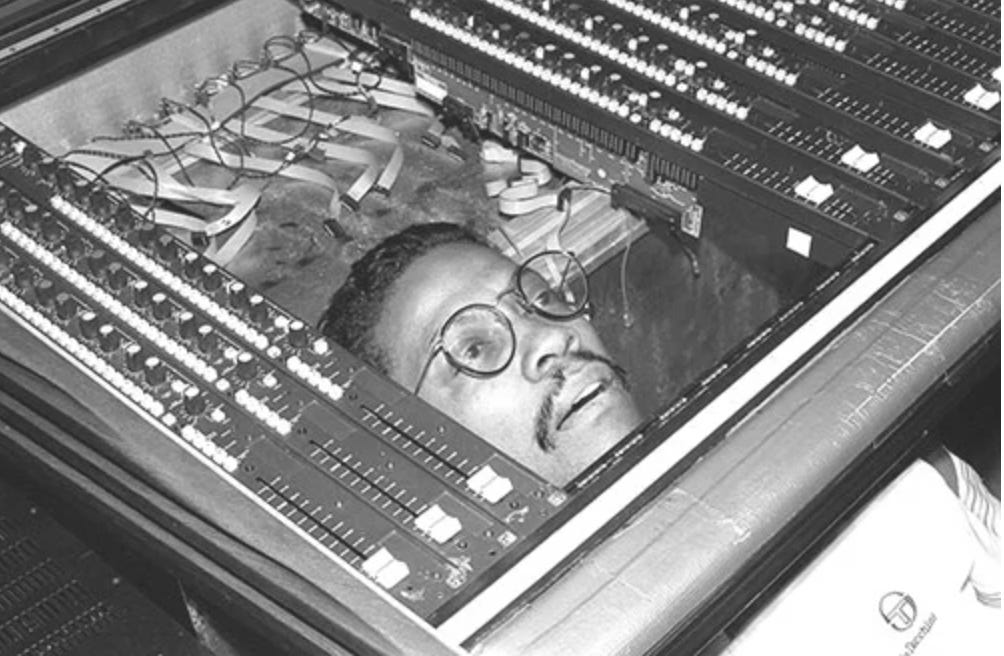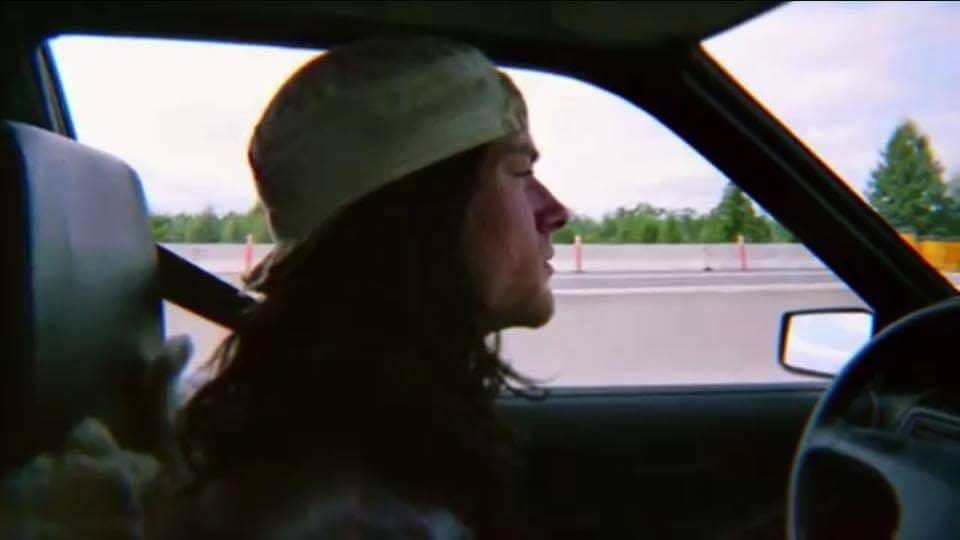I remember this Headhunters show well.
Paul Jackson, the bassist, broke a string on his bass in the middle of a solo. Rather than walking off the stage, he motioned his bass tech over. The guy knelt in front like he was fellating him and changed the string in about ninety seconds. Jackson didn’t drop a note. It was one of the most extraordinary feats of musicianship I ever witnessed.
I loved the Crystal Ballroom, I had the great good fortune of seeing it prior to its renovation by the McMenamin brothers in 1996. The erstwhile owner was in Cassidy’s Bar when I got off work. he offered to show it to me.
The place is like no other. It has one of the last floating dance floors––it looks like your usual gorgeous wooden dance floor, except it bounces like a trampoline. Literally–boing boing boing. The floorboards rest on cups of huge ball bearings set atop the adjustable joists. so the natural flexing of the long oak boards functions as a kind of a spring. They were quite fashionable in the 20s when dance marathons were all the rage.
The Crystal was also one of the only theaters that allowed Negro bands in the heavily segregated city. Acts reportedly included Duke Ellington, Cab Calloway, and Benny Goodman’s smaller combos. In the 60s, Ike and Tina Turner, the Isley Brothers (with a young Jimmy Hendrix on guitar, reportedly fired on the very stage for showboating) and Marvin Gaye all performed. A few years later, Blue Cheer, Buffalo Springfield, and the Grateful Dead played to hippie audiences.
By the time I saw it, the place was a ruin, having been closed since 1968. It had gone out of business due to poor management and was snapped up at a fire sale price by the Louie family, a notable Chinese clan who owned several of Portland’s famous Chinese restaurants including The Republic, Hung Far Low, and the venerable House of Louie. They put a padlock on it and nobody went in for decades.
Moon Louie took me over to the locked gate, took a huge ring of keys from his pocket and unlocked the rusty chain, then pulled the doors open and motioned me up the stairs.
The place had the derelict vibe of a haunted house, the steps blanketed with a thick layer of dust that rose in little puffs around my shoes.
When I stepped through the arch into the ballroom I gasped. It literally took my breath away, the most beautiful empty space I’d ever seen. All these years of driving by on NW Burnside and I never knew what was behind the vast windows. I felt that I’d been let in on a great secret, a place of mystery and magic. Moon walked a few paces behind me rattling off the shows that had taken place when he was a teenager. “Big Brother and the Holding Company. The Electric Prunes.”
I didn’t care about any of that. I cared about the building, this abandoned cathedral on the edge of downtown. It represented everything I loved about Portland.
The bouncing dance floor was broken in several places, creaking and sighing as I walked across the boards. The high arched windows were streaked with grime, the painted decorations around the proscenium peeling away.
I wanted to live there. Moon said he was selling it, and that they’d probably tear it down. “Build lofts,” he said, though this was 1993 and what became the “Pearl District” had yet to be inflicted on the city.
I lived in a loft across the street, the last bandit residence in Portland, a place with tall factory windows and high ceilings. The building served as a living reminder of the days when Portland was unfashionable and a guy like Phil Wikelund could argue with Michael Powell, buy the old radio store up the block, then set up his own rival bookstore.
I realized even then that those days were long gone, never to return. Yet here was this living, breathing hall of history, silent as a forest glen save for the hiss of traffic on the rainy street below.
I hoped with all my heart that it would be saved.
When the McMenamin Brothers rode in to the rescue I was overjoyed. They’d been making a habit of rehabilitating decrepit taverns and roadhouses, each fancier (and usually more haunted) than the last. There biggest project to date was turning the old Multnomah County poor farm into a concert venue and lodge. They’d secured the financing and made a going concern of it. Later, Mike told me that it was all practice. His eyes glinting above his full red beard, he said “We always wanted the Crystal, ever since we were kids.”
So they did it. Over the next year the ballroom was meticulously restored. The foor was taken up and rebuilt, one of the only bouncing wood floors left in the world. The arches were re-plastered, the old 1915 urinals sandblasted and coated with new enamel. Everything was done right, by the best craftspeople available. They added an old-fashioned billiard hall in the bar below and a small three-story annex across the street, a little place like a miniature Flatiron Building.
These trips down memory lane are bittersweet, but I’m glad to take them. It was a hell of a great time, lots of life packed into a very few months. Isn’t that always the way? As we age, time compresses behind us, like laundry in a Navy seabag. You pull out one wrinkled garment and a half dozen other things come out as well.
I lived right across the street and saw a bunch of shows there. Leftover Salmon, Phish, George Clinton (who played until four in the morning, telling everybody at last call to drink up and then dance their asses off), Sleater-Kinney, and Morphine.
And this show, Herbie Hancock and the Original Headhunters. This was the first time they’d regrouped in twenty years, and I was so excited to see them because Thrust was my soundtrack in those days.
I was working as a barman and holding vampire hours, and after a show I would sometimes walk over to Cassidy’s to have a drink or two before going home. I’d sit in my splendid loft and look out on the night city, the people walking on the sidewalk below oblivious to this man in the big windows trying to figure out how he got so lucky.
This diary entry is not about the concert I’d just seen. It’s about the hammered business bros I had been serving four nights a week at Kells, asshole Sons of Capitalism who thought that all their money gave the the right to behave like boors. I was so sick of them and their rude selfishness.
I had no idea the damage this type of individual would cause a few decades down the line, the same brand of shitheels who are gleefully taking digital sledgehammers to the flawed but useful architecture of the United States government.
I was rich myself, but not in any way those assholes would recognize.
Thanks for reading.
Sept 21st 1998
Herbie Hancock sold out the Crystal Ballroom last night to an almost all-white audience. He played with the original Headhunters, his first really popular band, a band that was really the first to blur the lines between rock, jazz and funk. He had several what can only be classified as pop hits: Chameleon, Watermelon Man, Thrust.
Suddenly, it seemed, jazz had become profitable.
Jazz has always seemed punk to me, not just because it’s difficult that it has an exclusive language. Its inherent punkness of it comes from the fact that anybody who plays jazz never has a ghost of a chance of making any money.
Modern jazz was never a big-seller and the future doesn’t seem any different. Even the best players are all consigned to holding down day jobs, marrying well, or living in perpetual poverty. Money don’t matter they say when they see Milli Vanilli become millionaires by lip synching, and the finest studio musicians playing jingles for soft drinks or auto insurance.
Money don’t matter.
The reconciling of financial success must be a tough one for anyone with a punk ethic. I remember a story about how Kurt Cobain, suddenly wealthy and famous from one hit song, bought a Lexus. His punker friends ripped him for being a yuppie and a sellout, so he took the car back to the dealership and retrieved his beater Volvo.
I’m sure that that didn’t help as far as his friends were concerned. Kurt had sold out. Bigtime. And he got paid.
But in this country, personal value and personal financial value are almost indistinguishable. The old credo of “if you’re so smart how come you’re not rich?” is burned into us at an early age, as is the notion that money is a fix-all which, if bestowed, makes for instant happiness and satisfaction.
Of course, if you look at the restless behavior of the wealthy celebrity set, you can see that the inverse is actually true; routine arrests, divorces and DUI’s are more the norm than anything.
Money doesn’t buy happiness. It buys a great lawyer to bail your sorry famous ass out of jail, Dana Plato. It pays for more rehab, Courtney Love.
Any waiter at a restaurant with an uber rich celebrity clientele will share his opinion of his customers’ manners. A friend of mind described Sharon Stone having a tantrum at Morton’s because the leaves of her Caesar salad were too big. Or too small. Or something. She let the waiters have it, asked to see the manager. By the time they had made it right she had moved on to something else. He told me of the genuine distress of all the Little People that Miss Stone was so unhappy. I think they may have fired the busboy.
So the big question is “If you’re so smart, why ain’t you rich?” The big question is “if you’re so rich then why ain’t you satisfied?”










Mike McMenamin let me in to the Crystal before they started the renovations and let me photograph inside; IDK if I still have any of the (pre-digital) images, but if I do, I'll share them with you.